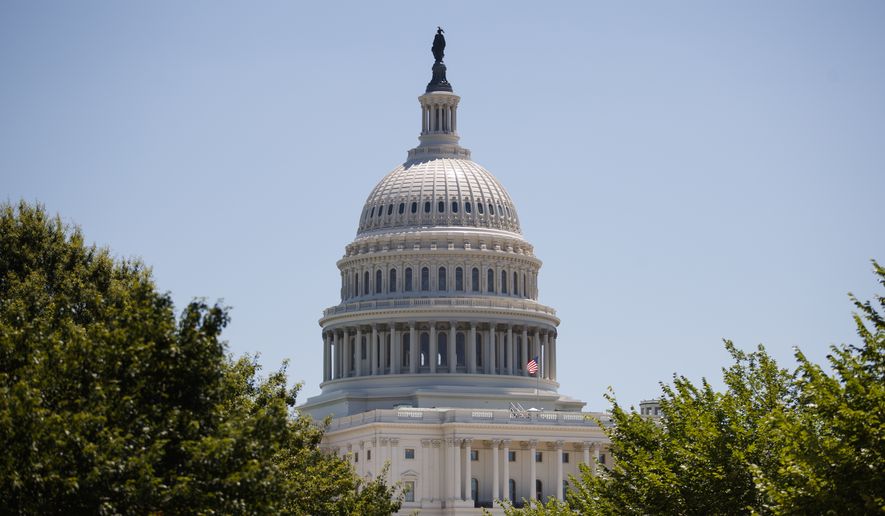The House Permanent Select Committee on Intelligence is poised to launch investigations into the Biden administration’s use of intelligence agencies to target Americans and to cloud the assessment of COVID-19’s origins, The Washington Times has learned.
Those questions are top-of-mind concerns for Rep. Michael Turner, an Ohio Republican who is expected to chair the committee when the next Congress convenes in January.
“There are grave constitutional concerns as to the intelligence community using the authorities, techniques and capabilities that we’ve given them against the American public, your friends, your neighbors, your family,” Mr. Turner said in an interview with The Times. “It is our assertion that they may be exceeding the authorities they’ve been given or operating in areas that may be ambiguous. We want them to justify those actions so that we can either close those loopholes or bring them back into compliance.”
Lawmakers are ramping up scrutiny of the national security community after a crush of reports that intelligence agencies have taken action against Americans, including parents concerned about their children’s education and people on social media publishing about volatile topics such as COVID-19 and the 2020 presidential election.
Mr. Turner declined to elaborate on specific examples of intelligence community dysfunction, but clues are evident in two resolutions of an inquiry he wrote in November after the midterm elections.
One resolution requested that President Biden hand over records regarding the “use of authorities, personnel, and capabilities of the intelligence community to conduct domestic activities unrelated to foreign intelligence.”
SEE ALSO: Fauci: Not worried about Musk tweets, but they do raise personal risk
Mr. Turner said this document request was prompted by a March 2021 report from the Office of the Director of National Intelligence on the heightened threat of domestic violent extremism.
An unclassified summary of the threat in March 2021 said perceptions of government overreach and bias against minorities would drive the radicalization of domestic violent extremists, what ODNI analysts dubbed DVEs, and mobilize them to take action.
“Newer sociopolitical developments — such as narratives of fraud in the recent general election, the emboldening impact of the violent breach of the U.S. Capitol, conditions related to the COVID-19 pandemic, and conspiracy theories promoting violence — will almost certainly spur some DVEs to try to engage in violence this year,” the summary said.
Mr. Turner’s second resolution asked for records relating to the intelligence community’s investigation of COVID-19’s origin that yielded an inconclusive report last year.
“There’s a significant belief by our members that the unclassified version of the report does not adequately reflect the assertions and conclusions of the classified report,” Mr. Turner said in the interview.
A declassified assessment that the ODNI published in October 2021 said the intelligence community did not reach a consensus about the origin of the coronavirus.
“The IC remains divided on the most likely origin of COVID-19,” the assessment said. “All agencies assess that two hypotheses are plausible: natural exposure to an infected animal and a laboratory-associated incident.”
Mr. Turner would not say whether discrepancy observed by his colleagues involved the conclusions or confidence levels of the intelligence community’s findings about the virus’ origin.
“We’re wanting a greater ability to review how they came to the conclusions in the classified report so that we can engage in a discussion as to why some of this information, some of these assertions, didn’t make it to the unclassified report or are not accurately reflected to our members’ opinion,” he said.
As Republicans prepare to take charge of the House, Mr. Turner’s inquiries telegraph the investigatory aims of the intelligence committee in the next Congress.
Democratic lawmakers have not made an effort to obstruct Mr. Turner’s push. Both resolutions were reported out of the committee without recommendation last week.
Rep. Adam B. Schiff, the California Democrat who chairs the committee, has been mum on Mr. Turner’s effort. Schiff spokesperson Lauren French did not disclose the congressman’s view of the resolutions but noted that the resolutions were reported without recommendation.
Mr. Turner said the intelligence committee’s actions to pass his resolutions tell the Biden administration that his requested inquiries do not represent an isolated view from some Republicans but a broader interest of lawmakers.
Although committee members appear to be working together, Mr. Turner said he is willing to use subpoena power to compel the Biden administration to answer questions.
The findings of the intelligence committee’s investigations are unlikely to exclusively involve the conduct of the Biden administration.
Reports produced during Mr. Biden’s tenure instigated Mr. Turner’s investigatory aims, but the lawmakers intend to investigate problems that trace back to previous administrations.
One accusation is that the FBI broke its rules for using investigative tools to target Americans before the Biden administration came to power.
A 2019 FBI audit first reported by The Washington Times showed that agents broke rules at least 747 times in 18 months while conducting investigations involving politicians, candidates, religious groups, news media and others.
For more information, visit The Washington Times COVID-19 resource page.
• Ryan Lovelace can be reached at rlovelace@washingtontimes.com.




Please read our comment policy before commenting.